MASTER'S PROGRAM IN CLIMATE CHANGE AND DEVELOPMENT
Introduction
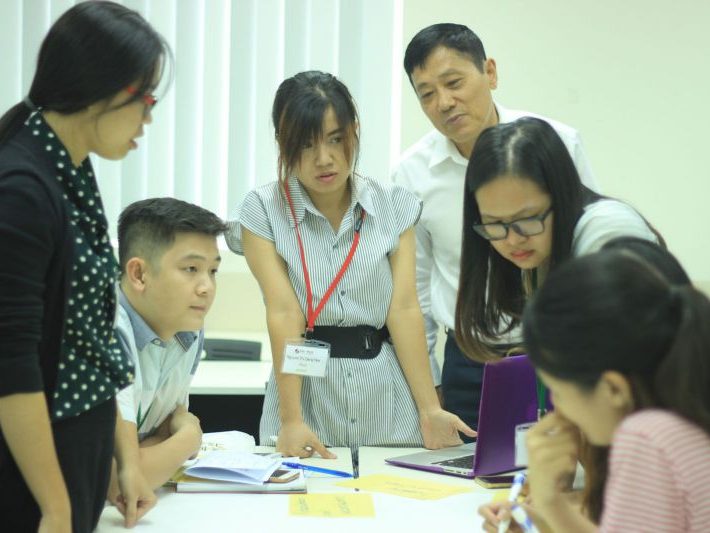

MCCD Class Activities
1. Short description
The Master’s program in Climate Change & Development (MCCD) at Vietnam Japan University (VJU), Vietnam National University, Hanoi was launched in September 2018. MCCD's educational program was developed to meet the urgent needs to respond to climate change for sustainable development, promoting leading edge scientific research, and developing high-quality human resources to be the next generation of leaders, managers, and experts in climate change response and development. MCCD has been developed and implemented with integrated quintessence of wisdom and experience from Vietnam and Japan (leading professors, lecturers, and experts). MCCD students have prospective job opportunities, involvement in professional and international learning and researching environments, and internships in Japan and Vietnam. MCCD aims to be a high-standard master's program for human resource training, scientific research, and technology transfer to contribute positively to climate change response for development as well as contribute to development associated with climate change response in Vietnam, Japan, Southeast Asia, and the world.
2. Training objectives
Climate change is an interdisciplinary research field, covering integrated knowledge of many fields in different sectors. The Master’s Program in Climate change and Development aims to promote leadership, life-long learning and adaptive capacity, and social responsibility of human resource in climate change response and development.
- PO1 (Professional leadership): Graduates will be a leading lecturer, researcher, manager, policy maker, decision supporting staff, consultant, start up and pioneer in project initiation and implementation of climate change responses (adaptation and mitigation), science of climate change, climate change impact and vulnerability, and sustainable development, participating in international and national forums, and promoting Vietnam – Japan cooperation on climate change response for development across allied fields.
- PO2 (Life-long learning, adaptive capacity): Graduates will have a good life-long learning and adaptive capacity: mastering and applying new, updated interdisciplinary knowledge, ideas, skills, and cutting-edge technologies for innovating the solutions to problems related to climate change and sustainable development to meet the evolving demand of stakeholders (e.g., public and private sectors, other organizations, and community); competent in adapting to changing national and international labour market and job environment and conditions.
- PO3 (Social responsibility): Graduates will have high responsibility for all their actions including proposals and solutions to problems related to climate change and development. They will be involved members of climate change professional societies or other professional organizations as well as in community-based and community service activities.
- Duration: 02 years
- Forms of training: Full-time training with a flexible schedule.
- Degree's name:
- Vietnamese: Thạc sĩ Biến đổi Khí hậu và Phát triển
- English: The degree of Master in Climate Change and Development
- Language of instruction: The training program is taught in English except for 2 following courses: Philosophy (in Vietnamese), Japanese (in Vietnamese and Japanese). The master thesis is written and defended in English.
- Location: Vietnam Japan University – My Dinh Campus
Career opportunity
The program offers a wide range of career opportunities, such as:
- Start-up businesses in climate change;
- Experts in science, technology and climate change management for development at enterprises, nature reserves, biosphere reserves, and tourist destinations;
- Managers, policy makers, policy advisors in management agencies, consultants on climate change response and development in socio-political, international and non-governmental organizations;
- Researchers and lecturers in academia.
ADVANTAGES OF THE PROGRAM
- High quality program, based on the curriculum of Ibaraki University, modified to meet the requirements of Vietnam context;
- International academic environment; advanced teaching methods; modern laboratories; practical experience in one of the most vulnerable countries in the world but is a pioneer in response to climate change - Vietnam; learning and practicing the world’s leading technologies to tackle climate change from Japan; insightful guidance from well-known professors, scientists, excellent managers on climate change business in Vietnam and Japan;
- Substantially subsidized tuition fee; full merit-based scholarships for outstanding students;
- Modern knowledge and skills in multicultural context, especially Japanese language and culture;
- Opportunities to work in agencies, organizations, and enterprises or further study at doctorate level at universities in Japan and other countries.
MCCD statistical data (2018 - 2024):
- 70 lecturers and leading experts on climate change from universities and institutions in Japan and Vietnam;
- 26% of MCCD graduated students received scholarships for higher education in other countries;
- 18% MCCD graduated students working at international organizations (e.g., UN, JICA, GIZ, WWF, and KOICA);
- 15% international students;
- 100% MCCD students get jobs after graduation.
Co-coordinating university
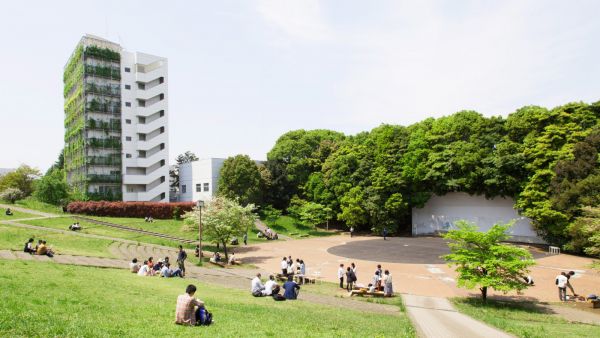
Ibaraki National University
Ibaraki University was founded in 1949. Today, the university has developed into a mid-size national university with five undergraduate colleges and four graduate schools.
Program Message
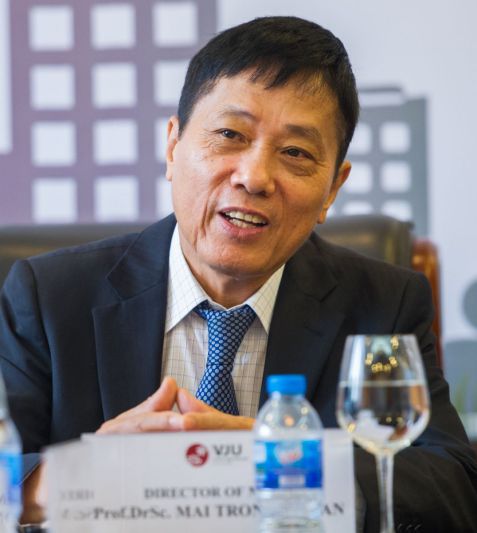
Prof. Mai Trong Nhuan
Program director
“Climate change is real and it is happening extremely day by day. Responding to climate change is an urgent task and a global mission with efforts from nations, organizations and individuals. Therefore, searching countermeasures for this catastrophe is urgent for the sustainable development, which creates many opportunities in climate change business, such as identifying the nature, analyzing, evaluating, forecasting climate change, its impact and vulnerability, implanting climate change adaptation and mitigation measures, developing low carbon and highly resilient economic and society in harmony with nature Responding to climate change also needs well-trained scientists and professionals experts with the tools and technologies to carry out the mission. In the context of extreme climate change, while the human resources to cope with climate change is lacking, the Master’s program in Climate Change and Development (MCCD) aims at training human resources who can grasp and excel in these highly demanding and sustainable job opportunities. We welcome candidates from various disciplines, from the social sciences, natural sciences and governance officers to the MCCD program at VJU to improve the knowledge and skills to meet the urgent needs of Vietnam in particular and the world in general in responding to climate change.”
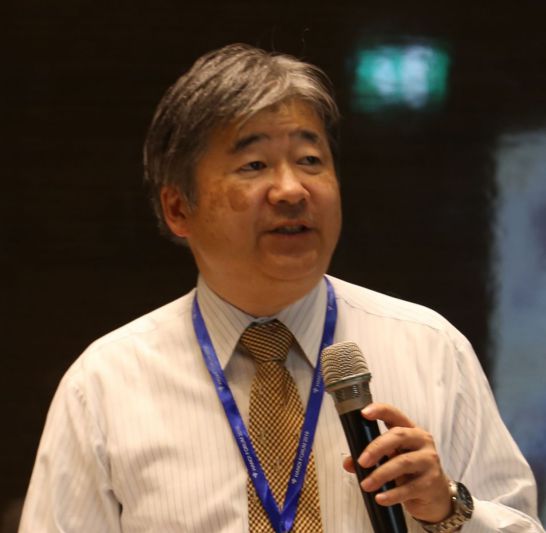
Prof. Dr. Kazuyuki Kita
Ibaraki University
Program co-director
“Climate change is one of the most critical risks which mankind has been faced with. All the people in the world would be more or less damaged by the harmful effects of climate change, and it is necessary for sustainable development to reduce the influences of climate change. The Master’s program in Climate Change and Development (MCCD) is a two-year program that integrating basic science of the climate change, its impact on nature, human and society, adaptive and/or mitigative countermeasures on it in various fields including industry, agriculture, economy and so on, as well as global/local policies corresponding to it. As part of the inter-/multidisciplinary programs under Vietnam Japan University, the MCCD prepares your knowledge from fundamentals to the forefront on the climate change, methodology to understand its impacts, and capacities to challenge difficulties caused from it by finding and solving individual problems with attractive lectures, exercises including fieldworks, internships, and studies in Japan. The MCCD includes research-oriented courses to be scientists, an educator or an expert on the climate change and management-oriented courses to be a manager, a policymaker and a social leader who has general, sustainable vision on the climate change problems, not only in Vietnam but also in foreign countries around the world. Please join our program and open the door to contributing to developing a sustainable society harmonized climate change.”
Education Program
The curriculum consists of a total 62 credits, including core courses of fundamental and professional knowledge as well as elective courses in each specified field.
| Course name | Number of credits |
|---|---|
|
General knowledge |
8 |
|
PHI5001 - Philosophy |
3 |
|
ENG5001 - English B2 (Postgraduate) |
5 |
|
Fundamental and specific knowledge |
29 |
|
Compulsory courses |
20 |
|
VJU6001 - Basic of Sustainability Science |
3 |
|
VJU6002 - Methodology and Informatics for Sustainable Science |
3 |
|
MCCD6001 - Fundamentals of Climate Change I |
3 |
|
MCCD6002 - Fundamentals of Climate Change II |
3 |
|
MCCD6003 - Climate Change Impacts and Vulnerability Assessment |
3 |
|
MCCD6004 - Climate Change Mitigation and Adaptation |
3 |
|
Students select one of two Japanese Language courses VJU5004, VJU5010 based on replacement test |
2/4 |
|
VJU5004 - Japanese Language Beginner |
2 |
|
VJU5010 - Japanese Language Upper |
2 |
|
Elective courses |
9/47 |
|
VJU5100 - Japanese Language I |
2 |
|
VJU5101 - Japanese Language II |
2 |
|
MCCD6005 - Academic English |
2 |
|
MCCD6010 - Climate Modeling |
3 |
|
MCCD6011 - Social Research on Climate Change |
2 |
|
MCCD6012 - Paleoclimatology |
2 |
|
MCCD6013 - Economics of Climate Change |
3 |
|
MCCD6014 - Climate Policy |
2 |
|
MCCD6015 - Climate Change Risk Assessment and Management |
3 |
|
MCCD6025 - Environment, Health and Societies |
2 |
|
MCCD6016 - Communities and Climate Change Adaptation |
2 |
|
MCCD6017 - Nature and Ecosystem-based Adaptation |
3 |
|
MCCD6019 - Climate Change and Security |
3 |
|
MCCD6022 - Sustainable Water Management |
3 |
|
MCCD6026 - Climate Projections: Uncertainty and Decision Making |
2 |
|
MCCD6027 - Climate Change Innovation |
2 |
|
MCCD6050 - Geo-informatics and Land use Planning for Climate Change Response |
3 |
|
MCCD6051 - Agricultural Adaption to Climate Change |
3 |
|
MCCD6052 - Sustainable Energy Development |
3 |
|
Scientific Research |
25 |
|
Project and research topics |
13 |
|
MCCD6053 - Academic Research and Project in Climate Change |
3 |
|
MCCD6054 - Interdisciplinary Fieldwork on Climate Change |
3 |
|
MCCD6055 - Climate Change and Sustainable Development |
2 |
|
MCCD6056 - Internship |
5 |
|
Master’s thesis |
12 |
|
MCCD7001 - Master’s thesis |
12 |
|
TOTAL |
62 |
Scholarships and tuition assistance
See scholarships and Financial aids here
Program's Activities
1. Theoretical and practical lectures
MCCD offers a comprehensive study of climate change. Most students are highly motivated to enroll in MCCD because once they enter the workforce, they realize the importance of learning about climate change. Since they all work, classes are held on weekday evenings and weekends.
In the first semester, students take compulsory courses in the fundamentals of climate change, climate change adaptation and mitigation, and climate change impacts and vulnerability; in the second semester, students take electives and choose from courses such as academic research and project in climate change, economics of climate change, Communities and Climate Change Adaptation, climate modeling, Geo-informatics and Land Use Planning for Climate Change Response, and so on. The third semester includes field research and internships in Vietnam and Japan, where students learn how to conduct research on climate change and how local governments and local farmers are adapting. Finally, students take Master’s defenses and those who pass the defense will graduate and get the Master’s degree in Climate Change and Development.
2. Field work and internship in Vietnam and Japan
Field trip (Xuan Thuy National Park, Nam Dinh Province) with Ibaraki University students
MCCD students visit Xuan Thuy National Park every year and conduct the field surveys, questionnaire survey, and natural scientific sampling. After the field trip, students will analyze the data and summarize it as a presentation and report.
Internship in Vietnam in typical areas affected by climate change in Vietnam and Japan
The place to visit depends on the year. MCCD students have participated in research design, implementation, data analysis and presentation in the field of climate change and development.
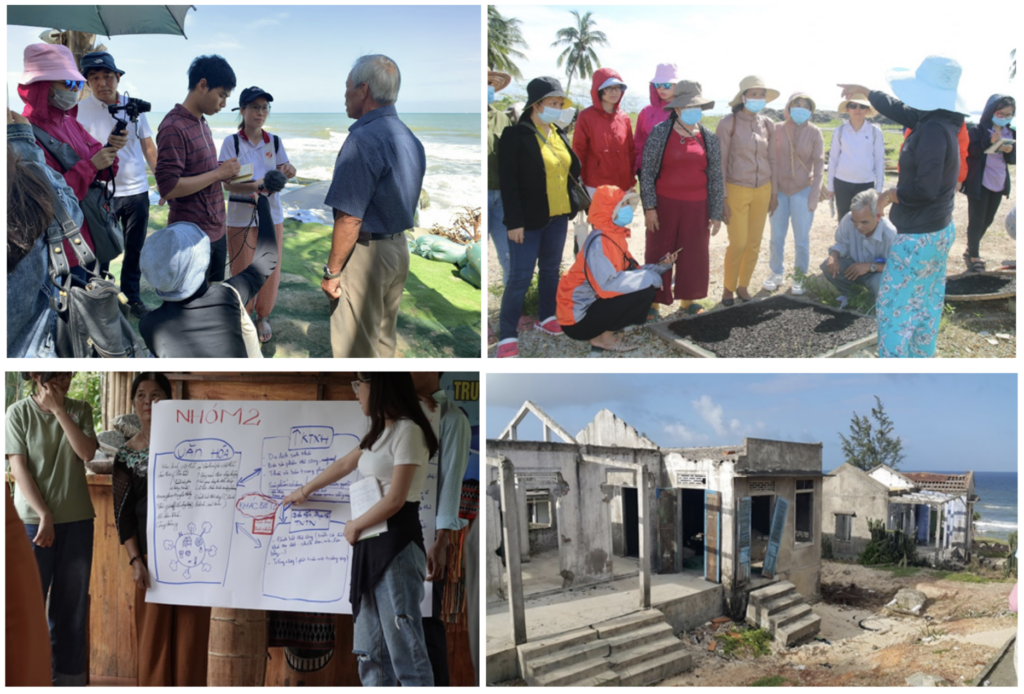
Internship in Da Nang and Quang Nam provinces in November 2020
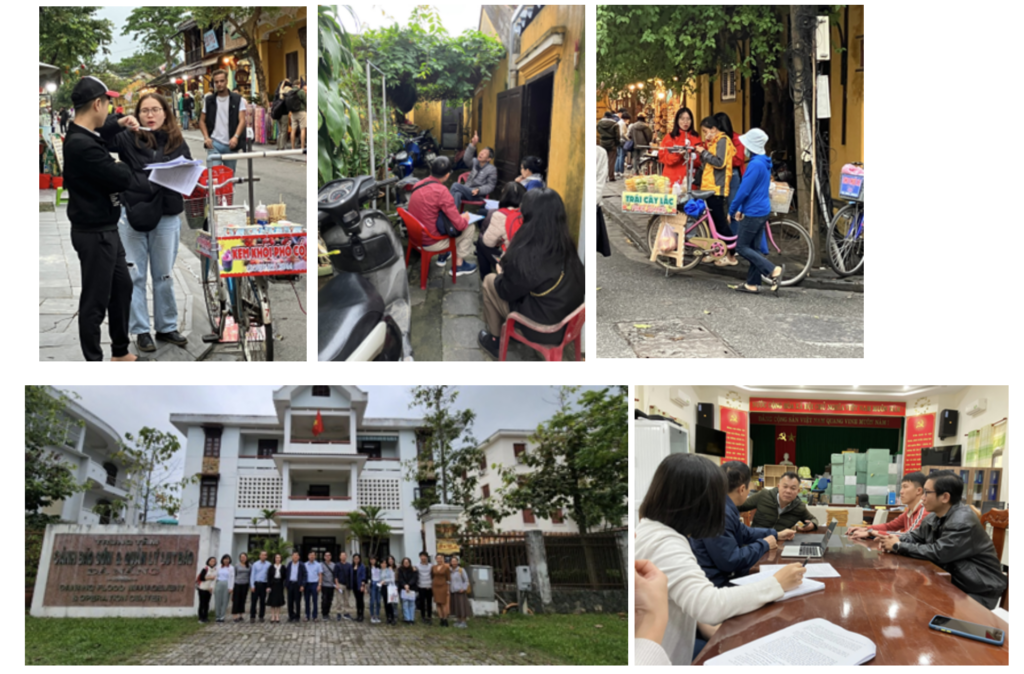
Internship in Da Nang City and Hoi An (Quang Nam Province) in January 2023
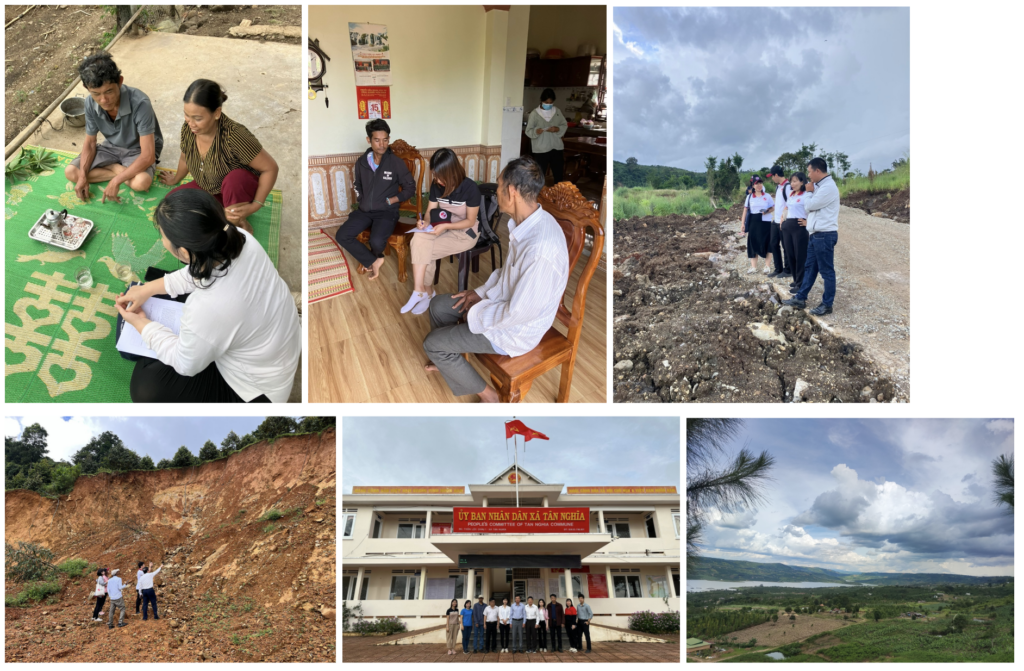
Internship in Japan
Since Japan is a disaster-prone country, they have many experiences and technologies on how to cope with disasters such as projections at the institutions and universities, respondents at the local government, and adaptations in farmers. MCCD students will visit many institutions, universities, companies, local governments, and places that were seriously damaged by climate change and learn the knowledge including how to adapt and cooperate with the disaster in each sector.
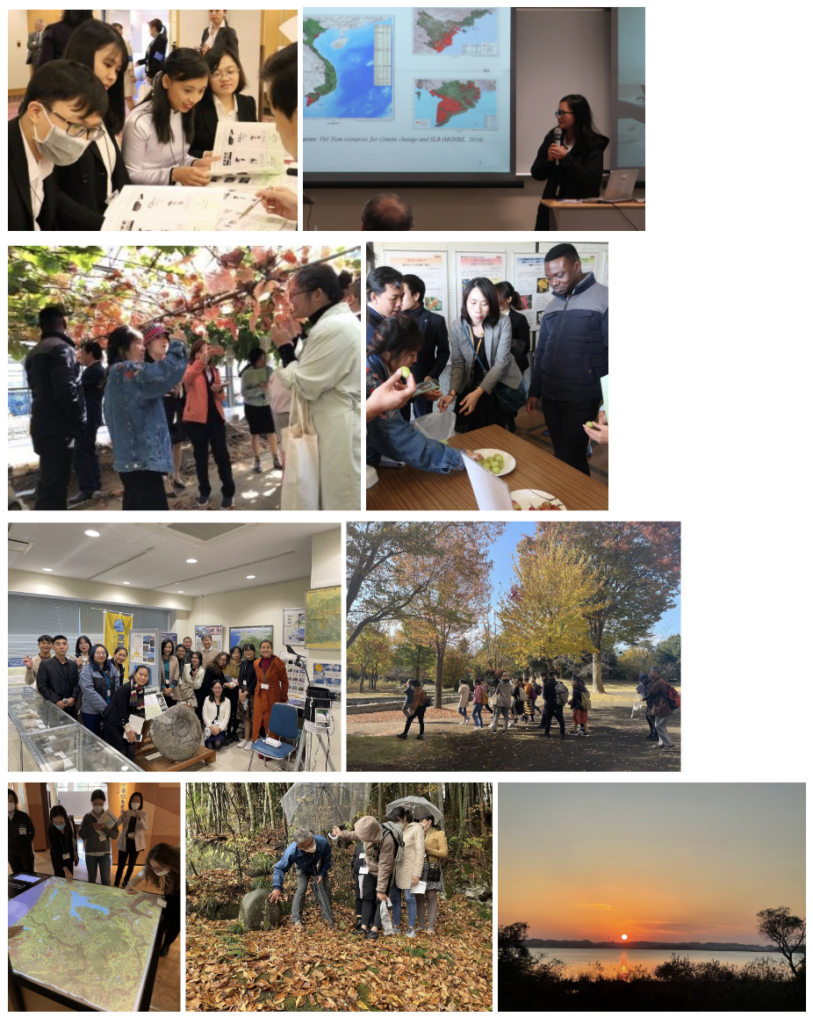
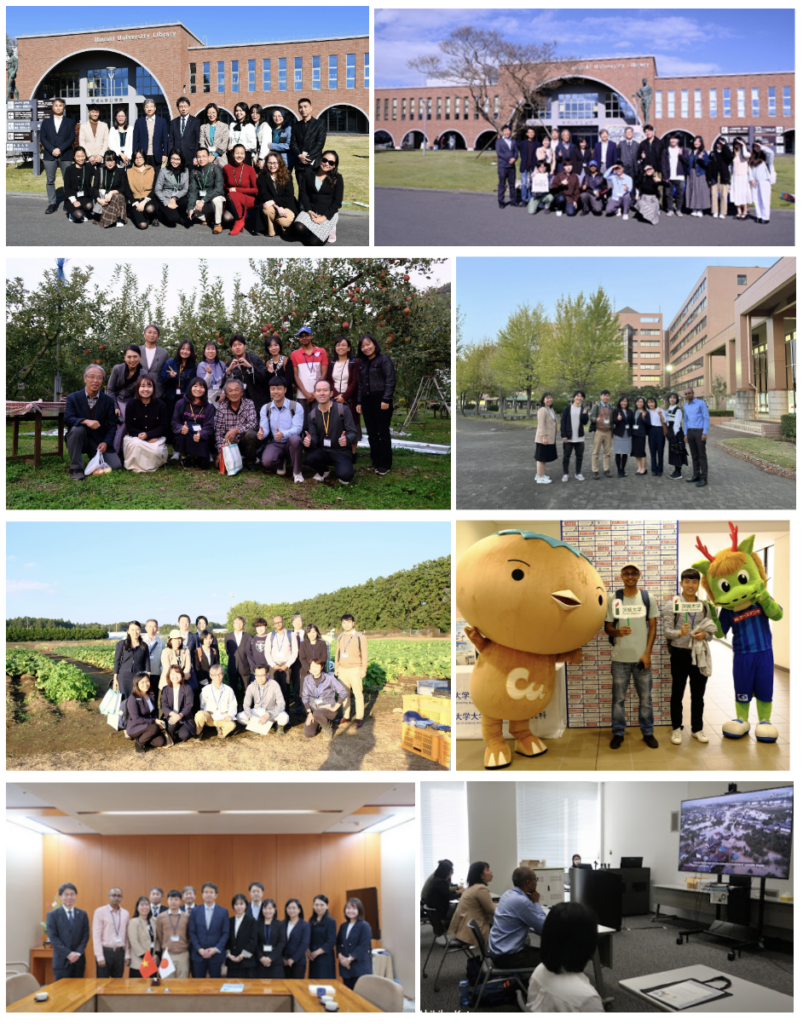
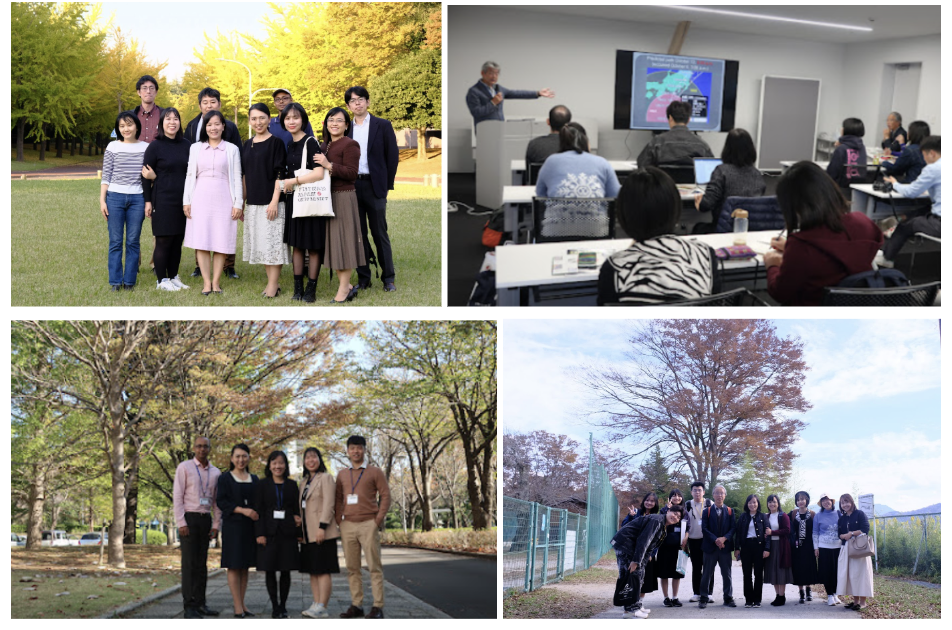
3. Other activities
Special lectures and international conferences/workshops: Asian Development Bank, Institute of Hydrology and Meteorology Science and Climate Change, Hanoi Forum, Climate change Network, Water Week, Sustainable Energy Development…


Tree planting events annually organized by MCCD for promoting collaborations among MCCD lecturers, students, and localities in climate change response
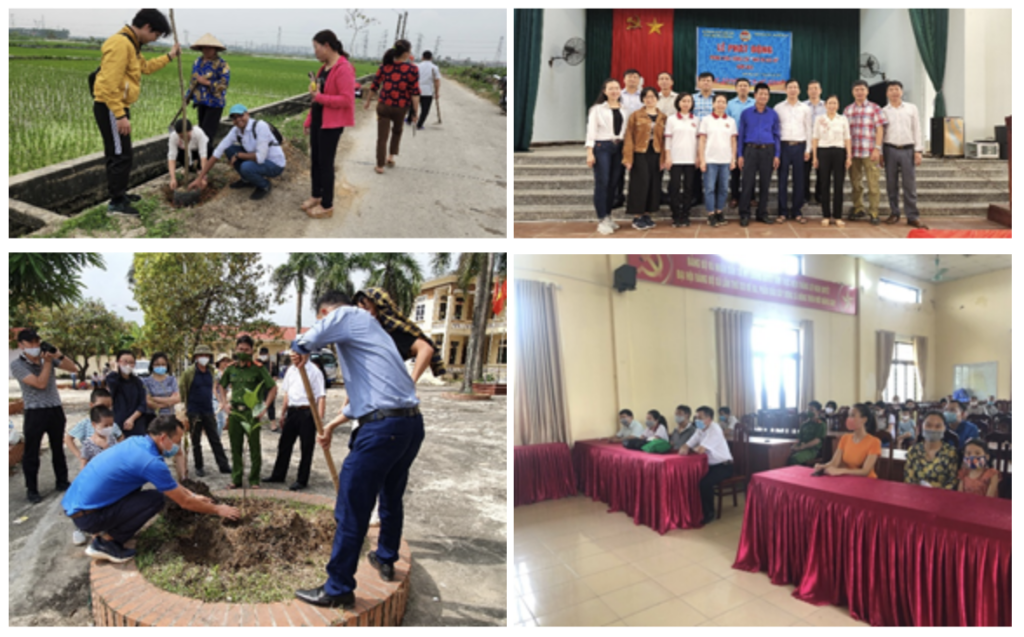
MCCD students work together with Japanese students

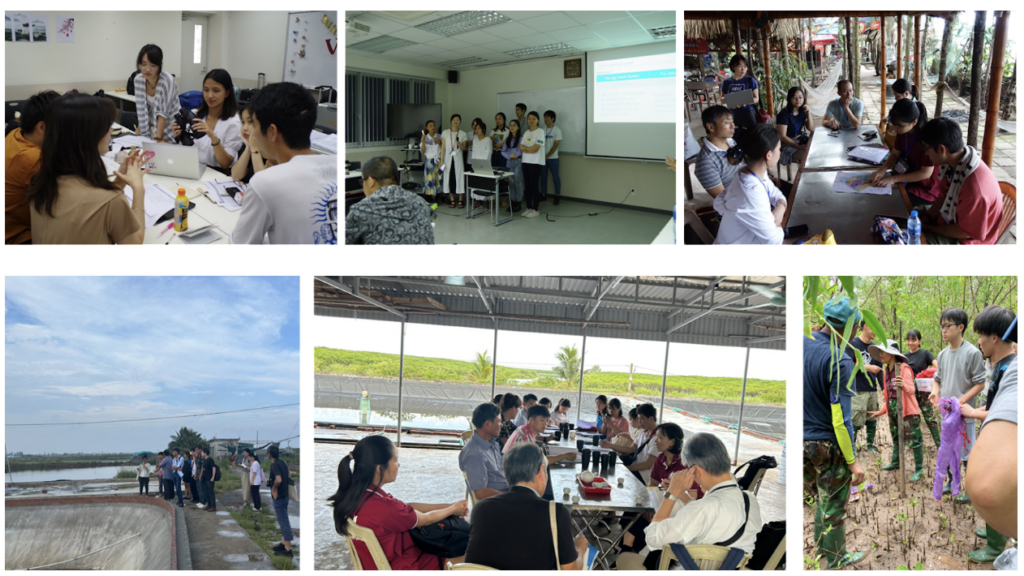
Learning outcome
1. Professional knowledge
a. General knowledge
- PLO1 – Apply the basic knowledge and principles of Marxism – Leninism and sustainability science to identify and solve specific climate change and development issues.
b. Fundamental and specialized knowledge
- PLO2 – Apply the fundamental, interdisciplinary knowledge and methodologies to assess and address actual problems related to climate change mitigation, adaptation for sustainable development at the global, national and local levels.
- PLO3 – Assess and propose solutions to some specific issues related to climate change, climate change response, climate change impact and vulnerability for sustainable development based on knowledge on science, technology, innovation and governance.
2. Skills
a. Professional skills
- PLO4 – Qualify English proficiency (at level 4/6 according to English competencies Framework for Vietnam) and acquire basic Japanese communication skills to adapt to competitive working environment and promote development cooperation.
- PLO5 – Design and implement a certain research or project to solve issues related to climate change and development.
- PLO6 – Master methodologies for data collection and analysis to solve certain issues. b. Support skills
- PLO7 – Demonstrate systematic thinking and independent thinking; ability in cooperation and engage with stakeholders (individuals, agencies, and organizations) domestically and internationally to solve the climate change and development issues.
- PLO8 – Demonstrate skills on time management, professional communication and presentation, effective job planning, working and conducting research independently.
3. Self-control and self-responsibility
- PLO9 – Demonstrate confidence, persistence, enthusiasm, and abilities to manage and take risks.
- PLO10 – Demonstrate social/community’s responsibility and professional morality, be able to adapt to multicultural environment, ensure the harmony among the stakeholders, demonstrate good attitude towards their career in climate change response for sustainable development.
- PLO11 – Demonstrate responsibility in conducting research, creating new knowledge, offering new ideas, and making expert decisions related to climate change response and development in different complex situations.
- PLO12 – Self-assess for developing professional knowledge, creating new ideas in new process, having good life-long learning capacity.
Typical students/ Alumni

Le Thi Ngoc Diep
Vietnam
MCCD Batch 2
VJU Batch 4
Working place: JICA Vietnam
“We are living in the world where uncertainty and complexity are increasing. Sustainability is threatened by many factors, such as climate, energy, and pandemic. Geopolitics risks are also rising. Changes have become more and more frequent and quick.
The journeys of my friends and me in VJU were strongly affected by the Covid pandemic. Some of our plans didn’t come true. But, every cloud has a silver lining. The orientations, advice, and support from VJU have helped us to have new perspectives and opportunities. The liberal education at VJU has infused us with the tools to flourish in this uncertain and complex world”.
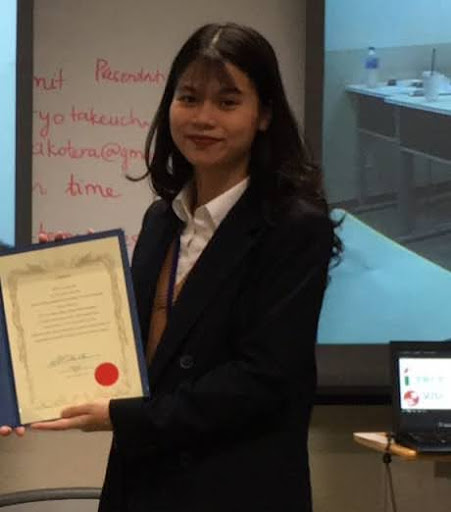
Nguyen Hoai Thu
Vietnam
MCCD Batch 1
VJU Batch 3
Working place: Vietnam Institute of Meteorology, Hydrology and Climate change
“In addition to providing specialized knowledge, I have received a lot of practical experience when exchanging with domestic and international experts and lecturers as well as visiting places with good lessons on responding to climate change. All have promoted and developed their creativity and research skills.”

Do Thi Nhinh
Vietnam
MCCD Batch 1
VJU Batch 3
Ph.D. student at Kyushu University with the MEXT scholarship
“After years working for research projects on climate change impacts and REDD+ funded by DANIDA, I went to VJU to systemize my knowledge and skills, and managed to learn how to combine natural and social sciences together (GIS & socio-economic survey) in investigating drivers of deforestation in Nghệ An province. Currently, I am doing my PhD studies at Kyushu University in Japan where I once again try to combine GIS and social studies to get an understanding about coal mining impacts on deforestation and local people’s perception about the benefits and negative sides of mining activities in Quảng Ninh.
I wish you guys to have an opportunity to explore the educational programs, job opportunities and healthy lifestyle in a Japanese environment in Vietnam and possibly do it later in Japan. Welcome you all to VJU, to study hard and play hard at the same time.”

Vu Minh Hang
Vietnam
MCCD Batch 3
VJU Batch 5
Title: Adaptation Fund Project Associate
Organization: United Nations Human Settlements Programme (UN-Habitat)
“Here is an ugly truth, whether you like it or not, climate change is happening, and it is inevitable. Here is an uglier truth, climate change hits you differently depending on who you are, where you are and what you do. The most vulnerable usually suffer the worst. However, climate change is, to some extent, manageable. It is all about choices, and it is all about making the right choices. Climate scientists are needed now more than ever, to solidify the foundation for righteous climate action, and promote a fair and just future for all.
My journey with VJU was indeed challenging, but it was a decision I would never regret. It is not just about the academic knowledge, it is also about the connections along the way, about the wonderful support and encouragement from my peers and sensei-s, that I have never experienced anywhere else. Choosing MCCD was the first step on my personal growth path to become a climate practitioner as I am today, hope it will be the same for you too.”
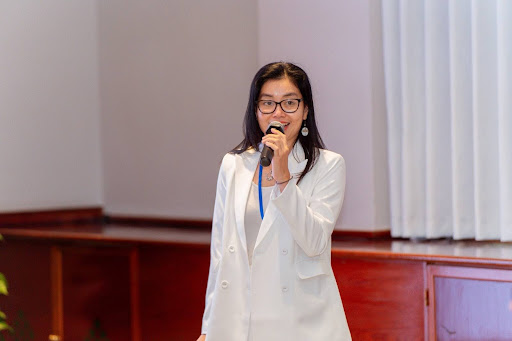
Nguyen Thi Phuong Lan
Vietnam
MCCD Batch 4
VJU Batch 6
Working place: GIZ
Project Officer – Climate Policy
Support to Vietnam for the Implementation of the Paris Agreement II (SIPA II)
“The journey with MCCD set the foundation for so-far the most important turn in my career pathway. Equipped with the knowledge and practical hands-on skills acquired in the last 2 years at MCCD, I am now in a strong position to provide technical assistance and advisory in different aspects of climate policy. For that I am deeply grateful for all the sharing, encouragement and support that I have received and am still receiving from MCCD professors, classmates and alumni community. The companionship they bring is among the most joyful and meaningful experiences I have ever had in my life.”

Yeshus Umesh
India
MCCD Batch 5
VJU Batch 7
Experience: Structural engineer with 10 years of experience.
Position: Technical Lead Structural Engineer (previously held)
Currently pursuing a full-time Master’s program.
After working as a structural engineer in the oil and gas field, I discovered a growing passion for addressing the critical global issue of climate change. Recognizing the urgent need for sustainable solutions, I made a conscious decision to shift my career path. This decision led me to pursue a Climate Change program at Vietnam Japan University, where I am eager to gain deeper insights into the environmental challenges we face and contribute meaningfully to the development of strategies for a more sustainable future.
The MCCD program, in collaboration with Ibaraki University and internship opportunities, provides a pragmatic pathway into climate science. My interest in natural science found profound understanding and potential for future exploration at Ibaraki University. I highly recommend VJU-MCCD to anyone passionate about climate science, as it offers a comprehensive and enriching educational experience with valuable connections and opportunities for practical application in the field.

Hla Phong Ko
Myanmar
MCCD Batch 6
VJU Batch 8
Working Place: RECYGLO PTE LTD.
Position: Business Development Director
“I’m diving into the Master in Climate Change and Development program at Vietnam Japan University (VJU). With over 8 years of hustling in sustainable initiatives, I’ve been knee-deep in managing sustainability projects and organizing some cool sustainability stuff in Myanmar, Singapore, Malaysia, Thailand, Korea, and Vietnam.
My gig at RecyGlo is all about making eco-friendly moves and tackling environmental impact head-on. Now, why VJU? Well, their Master’s Program in Climate Change and Development program vibes perfectly with my passion for environmental awareness and Climate Change responses.
I’m stoked to bring my real-world experience to the academic table at VJU. You know me – I’m all about practical, business-driven solutions for climate change. Their program is top-notch, emphasizing practical, business-driven solutions for tackling climate change – exactly what I’m passionate about.
I’d recommend this program to anyone eager to bridge the gap between sustainability and real-world impact. Trust me, it’s a journey worth taking. Let’s do this together at VJU!”
Admissions
1. Admission methods
- Admission (including application review and interview)
- Direct admission
2. Admission requirements
Vietnam Japan University established the Graduate Admission Council and assisting committees for the Admission Council according to regulations on graduate enrollment of VNU.
Diploma requirement
- The majors in Educational science and teacher training, Art, Humanities, Social and Behavioral Sciences, Press and Information, Business and Management, Law, Life Science, Natural Science, Mathematics and Statistics, Computer and Information Technology, Engineering Technology, Engineering, Production and Processing, Architecture and Construction, Agriculture, Forestry and Fisheries, Veterinary, Health, Social Service, Travel, Hotels, Sports and Personal Services, Service of Transportation, Environment and Environmental Protection, Security and National Defense.
- Majors that are highly interdisciplinary; majors trained abroad will be reviewed and decided by the Admission Council based on application documents.
Language proficiency requirement
Applicant must possess an English language proficiency that meets one of the following requirements:
- Holding a valid English certificate within 2 years from the exam date to the date of submission and was issued by an institution recognized by VNU. The minimum English certificate must be level 4/6 (B2) or equivalent (IELTS, TOEFL, Aptis ESOL International Certificate, Cambridge Exam, Vietnamese Standardized Test of English Proficiency). By enrollment time, student must submit an English certificate of level 4/6 (B2) to be recognized as an official student of the university.
- Holding a bachelor’s degree or a master’s degree, or a Ph.D. degree of an English-medium full-time study program in a country where English is used as the official language. The degree must be recognized by relevant agencies in accordance with current regulations.
Academic result and Working experiences
- Holding a bachelor’s degree of an advanced training program under MoET’s Project on advanced training in some Vietnamese universities; Graduated from talented, international, advanced, honor bachelor’s program or master’s program which have foreign language expected learning outcome equivalent to the level 4/6 onward of Vietnamese 6-level of foreign language ability framework within 2 years to the date of admission (expiry date does not apply to VNU’s degree).
Academic result and Working experiences
- No working experience is required for applicants with GPA≥ 2.5/4.0;
- At least 2 year of working experience is required for applicants with GPA from 2.0/4.0 – 2.5/4.0.
3. Estimated enrollment quota
- 15 students/batch
Contact
Program Office
P.506, 5th floor, Vietnam Japan University, Luu Huu Phuoc Street, My Dinh 1 Urban Area, Nam Tu Liem District, Hanoi
“- Program Director: Prof. Dr. Mai Trong Nhuan, Email: nhuanmt@vnu.edu.vn
– Program Coordinator: Assoc. Prof. Dr. Nguyen Thi Hoang Ha, Email: nth.ha@vju.ac.vn
– JICA expert: Dr. Ishikawa-Ishiwata Yuki, Email: yishikawa@vju.ac.vn
– Facuty assisstant in charge: MSc. Nguyen Thi Hong Nhung, email: nth.nhung@vju.ac.vn”

